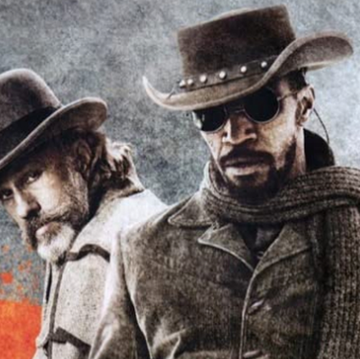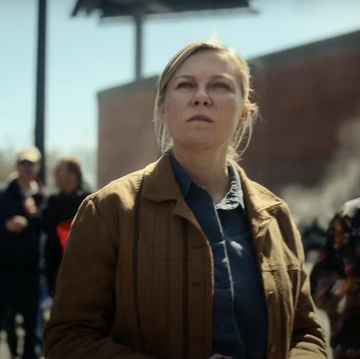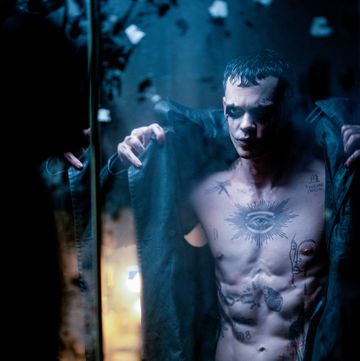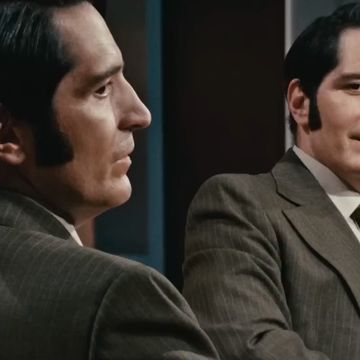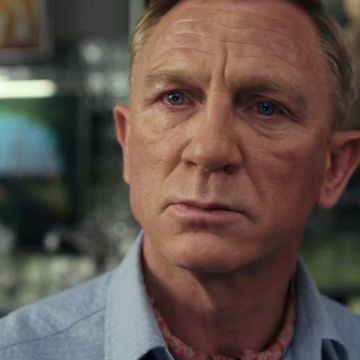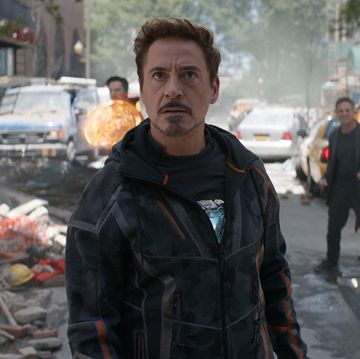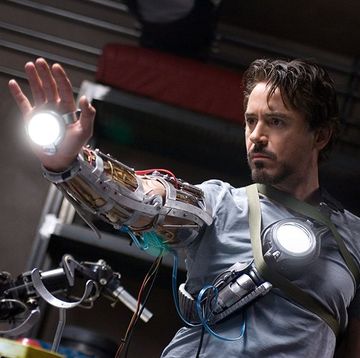26 Martin Scorsese Movie, Ranked From Worst to Best
With Killers of the Flower Moon finally in theaters, here's how the legendary director's career stacks up.
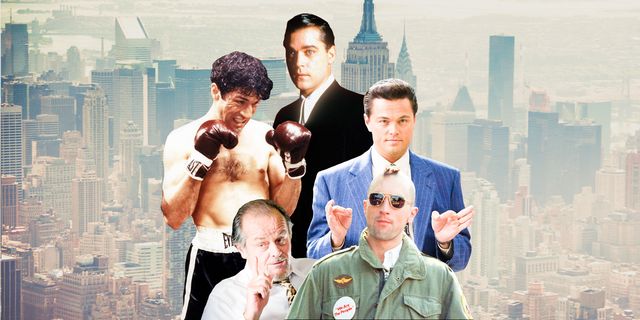
Ah, the smell of Catholic guilt and prison sauce is in the air! It can only mean one thing, fellow cinephiles: a new Martin Scorsese film just hit theaters. This time, it's Killers of the Flower Moon, which is based on David Grann's 2017 nonfiction book, Killers of the Flower Moon: The Osage Murders and the Birth of the FBI. Flower Moon is one of the best, and surprisingly, most stripped-down films the 80-year-old director has ever made. We highly recommend you clear the necessary three and a half hours to see it, dehydration be damned.
To celebrate the occasion, we ranked the director's films, from worst to best. One important note before we send you on your quest through the Scorsese-verse: this list only includes his narrative films. So, you won't find his also-great documentaries, music videos, and commercials (starring Timothée Chalamet!) here.
26. Boxcar Bertha (1972)
Dear intrepid film student: On the day Martin Scorsese comes up in your “Intro to Film” seminar, and the professor opens the floor to questions, know that mentioning Boxcar Bertha as top-five Scorsese is the quickest way to become that asshole. Boxcar Bertha is a loose adaptation of Sister of the Road, which tells a Bonnie and Clyde-esque love story between two train robbers. Of course, you can pluck moments from the film that show what Scorsese would later become, but it’s chock-full of tortured criminals and bloodshed (and not really, you know, in the Scorsese think-y way). —Brady Langmann
25. New York, New York (1977)
The 1970s were coming to an end and the so-called American New Wave movement was on the verge of complete implosion. After the spectacular success of Taxi Driver, Scorsese and De Niro were at the height of their influence. Scorsese, a well-known cinephile and lover of 1950s movie musicals, decided to take on the seemingly impossible challenge of updating the musical genre for the '70s cinema verité era. And that’s exactly what New York, New York turned out to be–a musical neo-noir that was half Fred Astaire and half Mean Streets. It’s Scorsese’s A Star is Born. And boy, was it a disastrous in its time. Going way over budget, riddled with on-set drug problems and scandal, film historians frequently cite productions like New York, New York as the self-indulgent auteur catastrophe that brought an end to the era of American cinema when directors, not producers, had complete authorship of productions. In the end, New York, New York, a tour de force display for Liza Minelli, stands as one of the weirdest experiments in American film history. Whether you like the movie or not, the film has proven itself to be enduringly relevant–the song “Theme from New York, New York” was written for this movie. —Dom Nero
24. The Color of Money (1986)
Another odd choice from Scorsese’s in his '80s run, Color of Money is the director’s only sequel. It’s also the only time the auteur continued another filmmaker’s story. But that doesn’t mean it’s not as authentically Scorsese as any of the films on this list. Starring Tom Cruise and Paul Newman, this follow-up to the beloved gambling billiards noir, The Hustler, is among the director’s most vicious and violent films. Just not in the blood and guts kind of way. Full of percussive smash cuts and pool-cue-striking-balls montages, the subtextual battle for alpha dominance between aging hustler Newman and young stud Cruise may as well be Scorsese’s second boxing movie. Unlike some of Scorsese’s more daring and experimental projects, The Color of Money is just so damn fun to watch. —DN
23. Who's That Knocking at My Door (1967)
It makes sense that Scorsese's career would start with such a direct exploration of a Freudian theory. To put it plainly–the male characters in Scorsese films, from Jake LaMotta in Raging Bull to Travis Bickle in Taxi Driver, lack the ability to maintain a functional relationship with women because their desire for a sexually liberated partner (in Freud’s terms, a “whore"), is in direct contradiction with their yearning for a virginal girl (the Madonna, or Virgin Mother of God). Who’s That Knocking at My Door follows that setup pretty explicitly, with Harvey Keitel’s Roman-Catholic character suffering from the realization that his girlfriend had lost her virginity long before their relationship started. The film began as a student project at NYU, and you can tell. A lot of the trademark Scorsese stuff that’s on display feels fresh, experimental, and unrefined. But it’s an impressive debut for a career that would span decades. —DN
22. Gangs of New York (2002)
While you might not remember all the loose ends of this sprawling, mid-19th century crime epic, it's impossible to forget almost every scene in which Daniel Day-Lewis graces the screen. There's his monologue about fear while draped in the American flag or his speech about how to kill while stabbing a hanging pig corpse. The sets and costumes are beautiful, Leo is classic early 2000s Leo, but the film doesn't work as cohesively as only a technical storytelling master like Scorsese normally pays off. It's worth a re-watch, but better yet, just find some of Day-Lewis's greatest scenes on YouTube. — Matt Miller
21. Bringing Out the Dead (1999)
There’s exhilarating urgency to Bringing Out the Dead, which is all the more impressive given that it’s the tale of a paramedic (Nicolas Cage) who’s in perpetual motion while nonetheless existing in a hallucinatory state of purgatory, often powerless to do more than comfort the injured and dying he treats. Set over the course of three days in New York’s Hell’s Kitchen, Scorsese’s unsung 1999 gem is a swirl of flashing red lights, steam pouring out of manhole covers, and Cage’s sunken eyes, taking in everything with equal parts empathy, misery and desperation. Working from Paul Schrader’s cutting and haunting script, Scorsese and Cage prove a harmonious pair, using imagery and gestures to suggest a hellish world where comfort is rare and answers are few – and in which striving to do the best one can, for as long as possible, is the only way forward. –Nick Schager
20. Kundun (1997)
Though it’s Scorsese’s most overtly spiritual effort since The Last Temptation of Christ, Kundun is not exactly a companion piece, insofar as it doesn’t treat its subject – the 14th Dalai Lama—as an individual wracked by passions, doubts and other relatable emotions so much as a veritable deity (or, rather, the reincarnation of a godly spirit). That’s arguably the biggest shortcoming of this 1997 film, tipping its story into hagiographic territory from which it can’t escape. The director’s yearning for enlightenment, and connection to God, is sincere and palpably felt in a series of set pieces enriched by Roger Deakins’ sublime cinematography and Philip Glass’ equally rapturous score. Still, it’s the rare Scorsese film without much in the way of narrative energy or tension, leaving it a handsomely mounted epic that fails to make much of a lasting impact on the head or the heart. –NS
19. Hugo (2011)
After decades exploring gangsters, tommy guns, and tortured tough guys, Scorsese took on a new kind of hero in the early 2010s—Hugo Cabaret, the 12-year-old clock-tinkerer who embarks on an adventure after the death of his father. Filmed in 3D (kind of a big deal in the Avatar aftermath!), Hugo is one of Scorsese’s most drastic departures from his typical style. It’s stuffed with things you wouldn’t necessarily associate with a Scorsese movie, and in this case, is all the better for it—full of childlike wonder, breathtaking setpieces, and gleeful performances from its leads. And it probably had the only trailer on this scored to a 30 Seconds to Mars anthem. —BL
18. The Last Temptation of Christ (1988)
The Roman-Catholic director has grappled with Catholicism all throughout his career. From Who’s That Knocking on My Door to Silence, the story of Jesus Christ has informed almost every Scorsese film, with the director constantly seeking to reconcile the Crucifixion and “original sin” of the Catholic religion through his tortured male protagonists. He showed us self-punishing characters like Jake LaMotta and Travis Bickle before, but in 1988, Scorsese finally got to hammer the nail into the real cross–in Last Temptation, he adapted the story of Jesus Christ. And the Catholic church was not happy about it. A film he had been trying to make since the very start of his career, the subversive production was protested aggressively, with a theater in Paris even being set on fire because of the incendiary themes. When all’s said and done, though, Last Temptation is among the most pious films Scorsese has ever made. Catholics were upset that Scorsese imagined the prostitute Mary Magdalene as Jesus’s lover, which they saw as blasphemous. But more so than any movie adaptation of the Catholic myth, Scorsese’s film has the courage to depict Jesus as a real human. A man, who’s every bit as sensitive, angry, and capable of love as the rest of us. He just happens to also be the son of god. As Last Temptation shows, the imperfection of Jesus’s humanity, not the infallibility of God, is what lies at the heart of the New Testament parable. —DN
17. Alice Doesn't Live Here Anymore (1973)
One of Scorsese’s least-referenced films is also one of his most endearingly human. Unlike the explosively violent movies for which the director has become known, Alice, which stars Ellen Burstyn, is intimate and tender. The perilous story of a down-on-her-luck single mother with a preteen son in the Southwest, the film features a notable early career debut of Kris Kristofferson. Surprisingly forward-thinking for its time, Burstyn’s performance is among her best, rightfully winning her the Academy Award for Best Actress in 1975. —DN
16. Shutter Island (2010)
Shutter Island’s tale of a Federal Marshal (Leonardo DiCaprio) who, while on the hunt for a missing patient, becomes stormed in on an island hospital for the criminally insane, is relatively slight compared with Scorsese’s epics. But this thriller still manages to be completely crushing, thanks to its claustrophobic, deeply-anxiety producing watery madhouse staging and DiCaprio’s truly devastating performance. The supporting cast, which includes Ben Kingsley and Mark Ruffalo, is pretty perfect, too. And yes, there’s a big, slightly cheesy twist that the whole movies pivots around, but it doesn’t negate everything that came before it or render the film too dull for a second viewing. Instead, it makes it even more heartbreaking.—GB
15. The Age of Innocence (1993)
Trading the mob-run mean streets of the Five Boroughs for the gilded drawing chambers of 1870s New York City, Martin Scorsese continues to chart the rituals and codes of rigid subcultures in The Age of Innocence, his gorgeously refined adaptation of Edith Warton’s renowned 1920 novel. The story of Newland Archer (Daniel Day-Lewis), engaged to decorous May Welland (Winona Ryder) but enthralled by independent spirit Ellen Olenska (Michelle Pfeiffer), is one about social mores, rebellion against the establishment, and the destructive power of irresistible passion. Though there’s no overt violence to be found here, there’s nonetheless immeasurable pain and sorrow, which Scorsese traces with an assured and delicate hand, revealing layers of longing, frustration and hurt through meticulous formal arrangements. Moreover, he elicits performances from Day-Lewis and Pfeiffer that, marked by emotional turmoil that’s as specific as it is universal, have only improved with age. –NS
14. Cape Fear (1991)
Robert De Niro gets his vengeful craziness on in Scorsese’s 1991 remake of J. Lee Thompson’s 1962 thriller, about a convicted rapist who, upon being released from prison, sets about terrorizing the public defender (Nick Nolte) whom he blames for his incarceration. With a lean, muscular frame covered in tattoos, De Niro cuts a menacing (and cackling) cigar-smoking figure, and Scorsese drums up tension by drenching the action in Hitchcockian flourishes (including a Saul Bass credit sequence and use of Bernard Hermann’s original score). The final houseboat skirmish is memorably apocalyptic, although the greatest source of suspense is De Niro’s unwholesome empty-theater pursuit of Nolte’s teenage daughter, here embodied by an Oscar-nominated Juliette Lewis with a mixture of innocence and toughness that’s as riveting as anything delivered by her illustrious co-stars. –NS
13. After Hours (1985)
Scorsese had already done Raging Bull. He’d made Taxi Driver. He’d had his big glitzy musical in New York, New York. And midway through the ‘80s, the voraciously prolific director had begun to lose his relevance. So he hunkered down and returned to the type of production he did best–street-level New York stuff. Not the elevated, dreary kind of work he’d done three years prior in King of Comedy. After Hours was Scorsese’s return to the NYU spirit of filmmaking. With a cast full of non-stars, and a wacky, high-voltage script from Joseph Minion, Scorsese proved himself as energetic and explosive as ever. A kaleidoscopic street tour of mid '80s downtown NYC, the film is as funny as it is transporting for a time in Manhattan history that has since been bought out by WeWork, Starbucks, and fancy high rise realtors in service of today’s sanitized start-up culture. —DN
12. The Aviator (2004)
A film about the life of filmmaker, airline magnate, and OCD-sufferer Howard Hughes could have just been another prestige biopic of the week, The King’s Speech before the king spoke. Instead, Scorsese elevated this portrait of the man who was once the wealthiest person in America above the middlebrow biographical hoards. The starry and impossibly talented cast helped, with Cate Blanchett as Katharine Hepburn and John C. Reilly as Hughes’ lieutenant Noah Dietrich. Of course, there’s Leo, transitioning from talented teen idol to legendary leading man with the help of his back-to-back Scorsese hat trick of Gangs of New York, The Aviator, and The Departed, devastatingly charming as Hughes in his heyday and tragic as the tycoon in decline. The whole movie’s a feast, but one sequence is particularly unforgettable. In it, Hughes crash lands a plane in Beverly Hills, tearing through the roofs of some homes, vivisecting others with the aircraft’s wing before crashing in a fiery explosion. In Scorsese’s hands, the wreck of the little two-seater feels as momentous as the crash of a Boeing 777. —GB
11. Silence (2016)
Toward the end of his fourth decade of filmmaking, Scorsese finally tied off one of his longest-gestating passion projects, and the result looks nothing like any other film in his oeuvre. Always an adventurous filmmaker first and foremost, the auteur had taken risks before, with films like Last Temptation and Kundun before, but Silence stands on its own. Starring Andrew Garfield as a Jesuit priest in Japan, the movie shares the heavy Scorsese themes of Christianity, sacrifice, and the burden of Catholic guilt. But other than thematic connections, Silence feels wholly different from the standard sensational blitzkrieg of Scorsese filmmaking. It’s paced slowly, with long, measured sequences bereft of the short of explosive jump cuts and snap-zooms for which the director is so well-known. It’s the work of an older, more meditative director, who’s more willing to reflect on the bigger picture than get lost in the daily minutiae of the street-level stuff. —DN
10. The Irishman (2019)
Before it was finally released in the fall of 2019, we'd been talking about The Irishman for more than a decade. Scorsese's passion project about mob hitman Frank Sheeran, Jimmy Hoffa, and the Bufalino crime family had been in development since 2004, but couldn't get funding until Netflix spent a massive $159 million on the film. Among all that baggage was the conversation about a new digital de-aging technique Scorsese used to tell one of the most compelling stories in American crime history. It's one with dozens of players, granule details, and major implications about the darkness lurking beneath—or rather on the surface—of America. Yet, among all this information, Scorsese is able to find nuance, humanity, and tragedy among some of the biggest figures in 20th century culture. — MM
9. The Departed (2005)
Let's forget about the rat for a second. You know, that gnawing, teething fucking rat from the closing scene of The Departed? The one fans have even edited out of the perfect cut of the movie? It runs across the final scene, beating you over the head with its obtuse symbolism. But for right now we're pretending that rat doesn't exist, because otherwise, The Departed is a masterful crime thriller. It's Scorsese at his most taught—building two-and-a-half hours of tension with shocking performances from everyone on screen. Jack Nicholson is doing some of his most unhinged, villainous work wince The Shining, while Leo is trapped and tortured in a way we haven't seen him before or since. — MM
8. The Wolf of Wall Street (2013)
Scorsese’s fifth collaboration with Leonardo DiCaprio recounts the life of Jordan Belfort, an industrious stockbroker who exploited America’s financial system for his own extravagant gain. Tracking its protagonist’s ascension to lofty industry heights (and immense wealth) through shameless fraud, The Wolf of Wall Street is a white-collar variation on Scorsese’s gangster films, depicting first the intoxicating rush of doing the wrong thing for selfish reasons, and then the well-deserved downfall to which such conduct invariably leads. DiCaprio’s smug arrogance is winningly funny even as it functions as a scathing critique of his character and the millions of others like him. The director casts his story—via form and content—as an example of gluttonous American excess writ large, all amoral greed and smug self-justifications that are as repugnant as they are, in this day and age, all-too-familiar. –NS
7. Killers of the Flower Moon
So, how does an old Italian man—famous for his portraits of other Italian men—tell a story that is, by some lines of reasoning, not his to tell? In his unspooling of the haunting, gut-wrenching history of the Osage murders in 1920s Oklahoma, Scorsese gets out of the damn way.
In Killers of the Flower Moon, the director does everything critics said Christopher Nolan didn't in Oppenheimer—mainly, memorializing the victims of white American terror. An early montage shows the murders of multiple Osage individuals, with a narrator reminding us that there was no investigation into each crime. When an Osage home explodes in the middle of the night, someone screams, "This is just like Tulsa!" Flower Moon doesn't ask for so much of your time out of self-importance, but because a tidy, two-hour-long film is entirely incapable of showing a sliver of the pain inflicted on the Osage. At the end of Flower Moon, when that moment comes—I won't spoil it—Scorsese earns it. The words spell pure heartache, delivered in a way the director would've never risked earlier in his career. —BL
In theaters
Watch Next

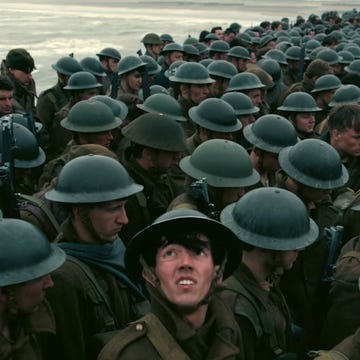
The 25 Greatest War Movies of All Time
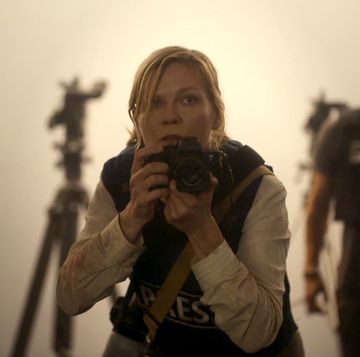
The Ending of ‘Civil War’ Should Scare You
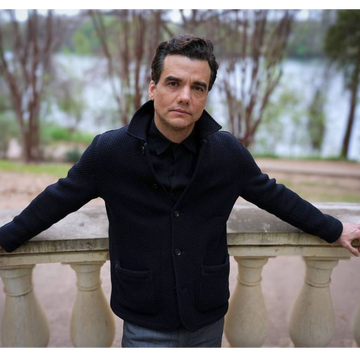
Wagner Moura Is Chasing the Truth
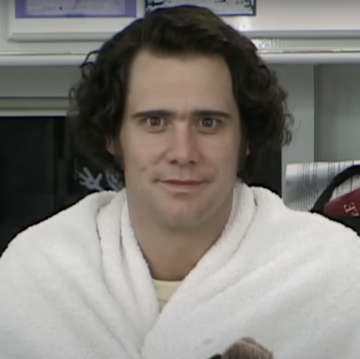
The 64 Best Documentaries of All Time
